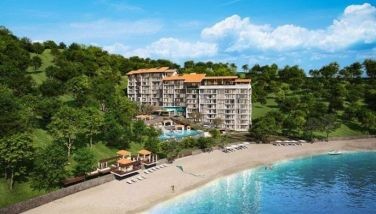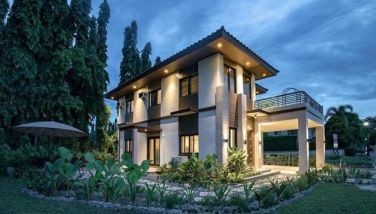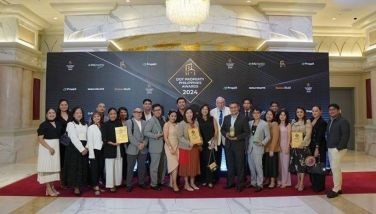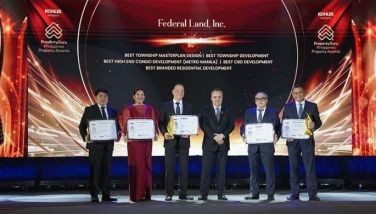Modern biotech lab in Iloilo nears completion
December 28, 2002 | 12:00am
TIGBAUAN, Iloilo – The construction of a modern biotechnology laboratory in this seaside town 24 kilometers west of Iloilo City is nearing completion.
The Japanese government-funded, P431-million Laboratory for Advance Aquaculture Technologies within the complex of the Philippine government-hosted Southeast Asian Fisheries Development Center Aquaculture Department (SEAFDEC AQD) is expected to be completed in early 2003.
The scientific edifice was among those visited by key officials of international donor agencies and institutions supporting and working on aquaculture and related fields in Asia and the Pacific who met recently in the Philippines.
The top-level "Regional Donor Consultation on the Role of Aquaculture and Living Aquatic Resources: Priorities for Support and Networking," was sponsored by SEAFDEC, Network of Aquaculture Centers in Asia-Pacific (NACA), WorldFish Center (formerly International Center for Living Aquatic Resources Management or ICLARM), and Mekong River Commission (MRC).
The consultation aimed primarily "to discuss and raise awareness as to how aquaculture and aquatic resources relate to the rural people’s livelihoods and the role of collaborating regional institutions in addressing these issues."
The establishment of the state-of-the-art biotechnology laboratory is a joint initiative of the Department of Agriculture and SEAFDEC AQD. It was approved by the National Economic and Development Authority (NEDA) as a bilateral project between the Philippine and Japanese government for funding under the Japanese Grant Aid for Fisheries.
The project will be implemented pursuant to the objective of the Medium-Term Fisheries Management and Development thrust for the fisheries sector.
Speaking at the recent donor consultation held at the Hotel Intercontinental Manila in Makati City (first two days) and at SEAFDEC AQD in Tigbauan (third day), then Agriculture Secretary Leonardo Secretary announced that by 2003, thanks to the Japanese government, the advanced aquaculture laboratory within the SEAFDEC AQD premises in Tigbauan will be fully operational.
"This will greatly impact on local aquaculture research and development, especially in biotechnology," Montemayor said. "Among the other research activities lined up are the formulation of cost-effective and environment friendly feeds, development of disease-resistant fish and shrimps stocks, and development of fish vaccines."
With DA as the project proponent and recipient of the facilities, the biotechnology laboratory will be operated by SEAFDEC AQD, headed by Dr. Rolando Platon, chief, and the Bureau of Fisheries and Acquatic Resources (BFAR), headed by Director Malcom Sarmiento Sr.
The new laboratory facilities are expected to enable SEAFDEC AQD to develop more advance aquaculture technologies, which will eventually be disseminated to fishfarmers for adoption.
The Japanese government-funded, P431-million Laboratory for Advance Aquaculture Technologies within the complex of the Philippine government-hosted Southeast Asian Fisheries Development Center Aquaculture Department (SEAFDEC AQD) is expected to be completed in early 2003.
The scientific edifice was among those visited by key officials of international donor agencies and institutions supporting and working on aquaculture and related fields in Asia and the Pacific who met recently in the Philippines.
The top-level "Regional Donor Consultation on the Role of Aquaculture and Living Aquatic Resources: Priorities for Support and Networking," was sponsored by SEAFDEC, Network of Aquaculture Centers in Asia-Pacific (NACA), WorldFish Center (formerly International Center for Living Aquatic Resources Management or ICLARM), and Mekong River Commission (MRC).
The consultation aimed primarily "to discuss and raise awareness as to how aquaculture and aquatic resources relate to the rural people’s livelihoods and the role of collaborating regional institutions in addressing these issues."
The establishment of the state-of-the-art biotechnology laboratory is a joint initiative of the Department of Agriculture and SEAFDEC AQD. It was approved by the National Economic and Development Authority (NEDA) as a bilateral project between the Philippine and Japanese government for funding under the Japanese Grant Aid for Fisheries.
The project will be implemented pursuant to the objective of the Medium-Term Fisheries Management and Development thrust for the fisheries sector.
Speaking at the recent donor consultation held at the Hotel Intercontinental Manila in Makati City (first two days) and at SEAFDEC AQD in Tigbauan (third day), then Agriculture Secretary Leonardo Secretary announced that by 2003, thanks to the Japanese government, the advanced aquaculture laboratory within the SEAFDEC AQD premises in Tigbauan will be fully operational.
"This will greatly impact on local aquaculture research and development, especially in biotechnology," Montemayor said. "Among the other research activities lined up are the formulation of cost-effective and environment friendly feeds, development of disease-resistant fish and shrimps stocks, and development of fish vaccines."
With DA as the project proponent and recipient of the facilities, the biotechnology laboratory will be operated by SEAFDEC AQD, headed by Dr. Rolando Platon, chief, and the Bureau of Fisheries and Acquatic Resources (BFAR), headed by Director Malcom Sarmiento Sr.
The new laboratory facilities are expected to enable SEAFDEC AQD to develop more advance aquaculture technologies, which will eventually be disseminated to fishfarmers for adoption.
BrandSpace Articles
<
>
- Latest
Latest
Latest
October 11, 2024 - 3:45pm
October 11, 2024 - 3:45pm
October 10, 2024 - 11:30am
October 10, 2024 - 11:30am
October 5, 2024 - 12:08pm
October 5, 2024 - 12:08pm
September 24, 2024 - 1:00pm
September 24, 2024 - 1:00pm
September 13, 2024 - 4:00pm
September 13, 2024 - 4:00pm
September 9, 2024 - 9:45am
September 9, 2024 - 9:45am
Recommended


























